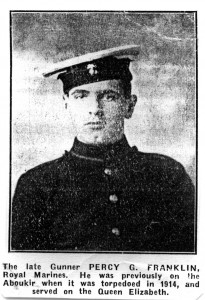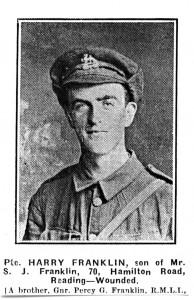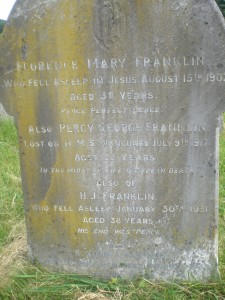Reginald E. V. Pratt
Private 2713
1st/4th Royal Berkshire Regiment
Division 64
Extension
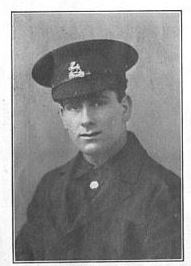 |
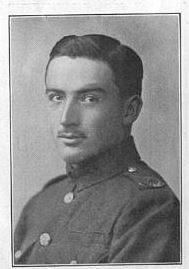 |
Note on photographs: It is believed that the photograph on the left is that of Reginald Pratt and that the photograph on the right is of a C.H.Jenkinson of Blenheim House, Emmer Green. Both men served in the 1st/4th but captions in Berkshire and the War and comtemporary news papers give conflicting information, therefore both pictures are shown.
Reginald Pratt is commemorated on a large family headstone. Berkshire Family History Society classification 64D45. He lived with his parents at 112, Salisbury Road, Reading. Reginald Pratt enlisted soon after the outbreak of war. He had been born in Oxford and was educated at Oxford Road schools. For some time he played football for Caversham St. Peter’s. He had a brother William James Pratt who had been invalided home. The William James Pratt who died in 1945 aged 75 years and is buried in the grave bearing the headstone is probably his father. A second brother, George Albert Moxey Pratt, was in the Navy. He is buried in the cemetery in Division 70 and he has a seperate entry on the site.
The first information obtained about Reginald Pratt came in a report in the Reading Standard 12th June 1915. A letter from Reginald to his parents tells of his narrow escape when wounded in the right arm whilst guarding a wiring party at work between the lines in Flanders (Belgium). His commanding officer commented that Reginald was always amongst the first to volunteer for such jobs and that his comrades though him fearless.
“I was out on a patrol between ours and the German trenches, when about a hundred yards away from the enemy’s trench I was shot. The bullet stuck in my arm, going upwards about 5 inched and coming out the other side. The doctor says it has splintered the bone in the elbow to the wrist. I was really lucky to be hit with a single bullet. For a second later I should have been riddled with them by a machine gun which the Germans turned on us. I don’t know how I should have got back but for our officers and sergeants, as I kept falling over the barbed wire entanglements”.
His commanding officer, H. Gorring, noted that, “The way he bore the pain showed pluck and endurance”.
The next time we hear about him in the paper it is the report of his death during the Somme battles. His captain, writing to his parents said: “It is with the deepest regret that I have to tell you that your son, R. E. Pratt, was killed in action on July 22nd*. We had captured a trench early in the morning, and after a time fresh bombs had to be sent up. The front line could only be reached across the open, and when the carrying party started they came under heavy fire. Your son was hit by a shell and killed instantaneously. It does, indeed, seem hard that a man who has already been wounded should suffer again. Your son was a smart, keen soldier; had he been spared he would have soon got promotion, as his name had already been put forward. We shall all miss him greatly; one can ill afford to lose good and experience soldiers at this time”.
Prior to the war he had been a fitter with the Great Western Railway in Reading.
Reginald was killed in action 23rd July 1916, aged 19. He is commemorated on the Thiepval Memorial Pier and Face 11D.
Although the 1st/4th were not involved in the first day of the Somme battle they were soon engaged. The following details are based on the Regimental history by Petre and show how the battalion was involved in the important attack for the high ground upon which lay the highly fortified village of Poziéres. (Poziéres had been an objective on the first day of the battle!). The account covers both the 22nd and early part of 23rd July.
“An attack was planned for dawn 23rd July and amid unceasing German shell fire and gas two platoons of “B” company held a section of line just west of Poziéres. The 1st/4th’s with the 4th Oxfordshire battalion were to jump off from a position known as Sickle Trench. The Oxfords attacked at dawn and although no certain information could be obtained, the wounded who were slowly returning indicated that the situation was critical. A hostile barrage grew more intense and “B” and “C” companies, of the Berkshire battalion, were sent forward in support of the Oxfords who were in an enemy trench some 300 yards away (possibly as bomb carrying parties). There were some losses from shell fire but the Berkshires reached the trench and eventually cleared the Germans from the strong point and advanced towards the German second line on the outskirts of Poziéres. Here there was fierce hand to hand fighting and use of bombs and bayonet. At 6.30a.m. a company of Bucks with fixed bayonets came over the hill from Ovillers and with effective rapid fire drove the enemy from their trenches in confusion. Those who escaped were shot by the enfilade fire from “C” company machine guns. The flanks were secure as was Poziéres village which had been taken by the Anzacs, who, by this time were frying their bacon breakfast among the ruins.”
